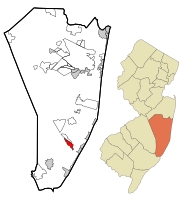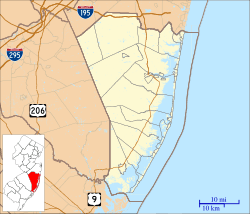Beach Haven West, New Jersey facts for kids
Quick facts for kids
Beach Haven West, New Jersey
|
|
|---|---|

Map of Beach Haven West CDP in Ocean County. Inset: Location of Ocean County in New Jersey.
|
|
| Country | |
| State | |
| County | Ocean |
| Township | Stafford |
| Area | |
| • Total | 2.12 sq mi (5.48 km2) |
| • Land | 1.62 sq mi (4.20 km2) |
| • Water | 0.49 sq mi (1.28 km2) 25.47% |
| Elevation | 3 ft (1 m) |
| Population
(2020)
|
|
| • Total | 4,143 |
| • Density | 2,557.4/sq mi (987.4/km2) |
| Time zone | UTC−05:00 (Eastern (EST)) |
| • Summer (DST) | UTC−04:00 (Eastern (EDT)) |
| ZIP Code |
08050
|
| Area code(s) | 609 |
| FIPS code | 34-04120 |
| GNIS feature ID | 02389182 |
Beach Haven West is a community located in Stafford Township, New Jersey. It's part of the famous Jersey Shore, a popular coastal area in the United States. This area is known as a census-designated place (CDP), which means it's a specific area identified by the U.S. Census Bureau for statistical purposes. In 2020, about 4,143 people lived here.
Contents
The Story of Beach Haven West
Beach Haven West was once a marshy area called Remson Meadows. It was located along the Manahawkin Bayfront. In 1950, two brothers, Herbert and Jerome Shapiro, bought these salt marshes. They were known for building vacation homes along the Jersey Shore.
The brothers used a special machine called a dredge. They brought it all the way from North Carolina. This machine helped them dig out over 130 saltwater lagoons. They also built about 5,000 single-family homes.
The community was built in different stages. The first part opened in 1957. This section included lagoons and streets between Morris Boulevard and Jennifer Lane. By the early 1960s, the second part was finished. This area stretched between Jonathan Drive and Walter Boulevard.
Later, the third part was completed. This included homes along Mill Creek Road, between Route 72 and Jonathan Drive. It also added the Charles Boulevard area. By the 1970s, the community grew even more. It expanded down Mill Creek Road towards East Point.
The Shapiro brothers eventually sold their remaining land. Another company, Lincoln Properties, LLC, took over. They finished the Mill Creek Road section down to Barnegat Bay. They also added the southern lagoons near Newell Avenue, called Village Harbour. The Colony Lakes section was developed by 1986.
Looking at satellite pictures, it seems the community was meant to be even bigger. There are signs of lagoons that were started but never finished. This shows that more expansion was planned. However, new rules and laws like the Wetlands Protection Act of 1970 stopped further building. This was done to protect the environment.
Where is Beach Haven West?
Beach Haven West covers about 2.14 square miles (5.5 square kilometers). Most of this area is land, but about a quarter of it is water.
The name "Beach Haven West" can be a bit confusing. It's actually located directly north of the town of Beach Haven. People think "west" was chosen because the mainland, where Beach Haven West is, is generally west of Long Beach Island, where Beach Haven is located.
Who Lives in Beach Haven West?
| Historical population | |||
|---|---|---|---|
| Census | Pop. | %± | |
| 1980 | 3,020 | — | |
| 1990 | 4,237 | 40.3% | |
| 2000 | 4,444 | 4.9% | |
| 2010 | 3,896 | −12.3% | |
| 2020 | 4,143 | 6.3% | |
| Population sources: 1980 1990-2010 2000 2010 2020 |
|||
In 2010, there were 3,896 people living in Beach Haven West. There were 1,915 households, which are groups of people living together. Most people were White. A small percentage were Black, Native American, or Asian. Some people were of Hispanic or Latino background.
The average age of people living here in 2010 was about 58 years old. About 10% of the population was under 18. Many residents were between 45 and 64 years old, or 65 and older.
Life in Beach Haven West
Many homes in Beach Haven West are used as summer houses. People from other parts of New Jersey, New York, and Pennsylvania own them. However, more and more people are choosing to live there all year round.
Kids in Beach Haven West go to schools in the Stafford Township School District for kindergarten through 6th grade. For grades 7 through 12, they attend the Southern Regional School District.
Homes in the Community
The very first model home opened in 1957 on Selma Drive. It was a Cape Cod-style house. It had two bedrooms on the first floor. The attic could be expanded later with dormers. These homes often had an outdoor shower.
The early homes had a 1950s look. They used asbestos siding and aluminum jalousie windows. Inside, they had dark wood paneling. The colors were bright pastels like yellow, green, and pink. Many homes were built quickly using mass production methods.
Most lots were 50 feet wide along the lagoon and 80 feet deep towards the street. In the 1950s, a waterfront lot with a house cost about $6,990. You could even get financing for about $66 a month.
Soon, more home styles were added. The smallest and least expensive was the Sandpiper model, costing $11,990. This was a three-bedroom ranch house. It had three bedrooms facing the street, a bathroom, a small kitchen, and a living room. These homes often had a screened porch across the back, which could be enclosed with windows. They also came with an outdoor shower and a wooden deck or bulkhead along the lagoon. Two young willow trees were usually planted in the backyard.
The largest home model was the Continental Riviera. It sold for about $23,000 in the 1970s. Homes built later in areas like East Point and Village Harbour had a 1980s Post-Modern style. Homes in Colony Lakes looked more like Colonial houses. Many of the homes built by Lincoln Properties had "reversed living." This meant the bedrooms were downstairs and the living areas were on the second floor.
Beach Haven West Civic Association
Beach Haven West once had a recreation center. It was located where Jonathan Drive, Morris Boulevard, Jennifer Lane, and Jeffrey Drive meet. This center had a clubhouse, boat slips, and a swimming pool. It was a popular place for social events in the 1950s and 1960s. By the 1980s, the pool was filled in and the clubhouse was taken down. New homes were built on that spot.
The Civic Association has been brought back to life. It now operates at a new location on Mill Creek Road. It helps the community in many ways. It offers playgroups for parents and young children. It also hosts other group meetings and serves as a voting place on Election Days.
See also
 In Spanish: Beach Haven West para niños
In Spanish: Beach Haven West para niños
 | Sharif Bey |
 | Hale Woodruff |
 | Richmond Barthé |
 | Purvis Young |




